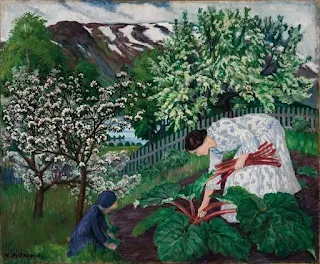 |
| I have to admit that I like the water-wheel in the image. |
Nikolia Astrup born in Norway 1880 and died in Norway 1928.
Notable for bold use of color and fantastical settings. The water flow in the image above gives Escher a good run for the money.
 |
| Vestiges of pagan rituals hang on |
 |
| Rhubarb in the springtime. Also known as Pie-plant in some places. |
Gustav Wentsel
 |
| Spinning |
Gustav Wentsel born 1859 in Norway and died in 1927 in Norway.
Wentsel struggled economically and many of his paintings showed evidence of rapid production as he had bills to pay.
 |
| The overhang on the roof of the building on the left is notable |
 |
| The balcony the entire length of the second floor is notable. It is clearly being used for laundry even while snow is on the roof. |
 |
| This cluster of farm buildings gives the sense that they were added onto as needs became known and resources were available. |
 |
| A working farm in the highlands. Highlands are typically less productive than the alluvial soils of lowlands. Presumably, farmers from the highlands were the most willing to emmigrate to the US. |
 |
| All hands on deck when the grain is ripe. A more detailed look at stooks. |
Anders Askevold
Rounding out our run of Norwegian artists is Anders Askevold born on Christmas 1834 and dying on October 22, 1900
Askevold's paintings are photographic in their realism and are very likable.
Looking at his paintings as one looks through a keyhole to discern the past, the cattle are not inbred nor bred to match an arbitrary color pattern or size.
His backgrounds suggest that Norwegians used livestock to glean calories and protein from the most distant mountain peaks, much like a fisherman casting a net into the sea.
The images of ships suggest that there were light, minimally keeled sailboats that plied the fjords and transferred loads to ocean-worthy crafts that shuttled between the mouths of the fjords and the major, commercial hubs.
Paintings by Askevold are much like a Glock 19. There might be better art for specific applications but very few intelligent people who will criticize you if you purchase an Askevold for a general-purpose "Hey, this room needs artwork" painting.



Insured a lot of old houses in the process of renovation. I put eyes on everything. If you got a really old one, there would be a log cabin in the center. Usually what they called a Texas. As they prospered they added on. Cash on the barrel head.
ReplyDelete